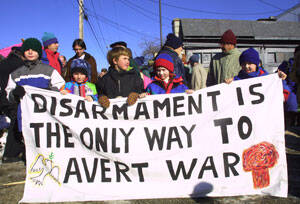In the introduction of their now-completed pastoral letter on war and peace, the Catholic Bishops of the United States speak of the “new moment” that helps define the context for their statement. The very introduction of nuclear weapons to the world stage in 1945 made necessary, in the words of the Second Vatican Council, “a completely fresh reappraisal of war.” The world has lived with the awesome implications of such weapons for almost four decades, but a more acute sense of the cosmic threat such weapons pose has recently captured the public imagination.
There are probably several reasons for this heightened public perception of the dangers of nuclear war. Among them would certainly have to be included the testimony of those scientists and physicians who, in the past several years, have described the likely effects of a nuclear attack in chilling clinical detail. The mass movement against nuclear weapons, although significantly different in Europe from North America, has on both sides of the Atlantic made public opinion an important force in the debate over public policy on nuclear strategy in the Western Alliance.
There is, then, a new “moment” in the continuing struggle of the human family to control the forces that human ingenuity have brought into being. It represents, in the bishops’ view, the possibility of a breakthrough in established assumptions, a chance to interrupt the cycle of the arms race in which the global superpowers seem locked, despite the recognition on both sides that the terms of this competition as it is presently waged have become increasingly dangerous and wasteful.
But the opportunity the bishops describe is only a “moment”; the debate will go on; the process of making the peace will continue. The bishops are under no illusions that their pastoral represents some utopian solution to the dilemmas of the nuclear age. Instead, they offer their pastoral as one contribution, the carefully wrought reflections of a group of religious leaders, to a debate and a process that concerns all the citizens of the planet and that should enlist the intelligence and commitment of all.
The pastoral speaks deliberately and explicitly to two distinct sets of readers: Catholics who look to their bishops for moral guidance and all men and women of good will who have a stake in the nuclear debate and may find the bishops’ views helpful as they exercise their right and responsibility as citizens to monitor the public policies set by their elected representatives. Although these two sets of readers overlap—Catholics are citizens as well—they will listen to the bishops with different expectations.
For Catholics used to a more dogmatic form of episcopal guidance, the pastoral may seem at first puzzling as the bishops distinguish as clearly as possible between the moral principles they affirm with magisterial authority and the specific applications of those principles that the pastoral makes, even while acknowledging that men and women of good will could come to legitimately different conclusions about such applications. This appeal of the pastoral is to a mature Catholic conscience, one that seeks to be informed by religious authority but accepts personal responsibility for those choices that must be made in particular, contingent circumstances. Religious authority, even in its most paternalistic mode—and the pastoral letter is clearly not in that tradition—can never be a substitute for this personal responsibility.
The reaction of those non-Catholics who fail to give the pastoral the serious attention it deserves may well be colored by a persistent skepticism about the competence of bishops to address issues that involve national security and the harsh realities of geopolitical rivalries. Indeed, much of what the bishops say in the pastoral runs counter to the conventional wisdom that has prevailed among strategic planners and even among those who have been involved in negotiations over arms control. The sad fact, however, is that the conventional wisdom has been largely ineffective in curbing and reversing the arms race, even though all the nations of the world, including the United States and the Soviet Union, recognize it to be a monstrous evil. While it is true that the strategy of deterrence has achieved a kind of peace over the last four decades, the cost to the world’s economies has been prohibitive and, as the nuclear stockpiles increase and possession of nuclear weapons proliferates, the probability of the actual use of nuclear weapons mounts.
The pastoral letter is a long and complex document. For the time being it is the final word the American Catholic bishops have to say on a most troublesome question. The real value of the document will be tested in the weeks and months ahead to the extent that it becomes a catalyst for a bolder and more morally-enlightened approach to the nuclear challenge. In this regard, the third section of the pastoral on the promotion of peace in an interdependent world may prove more valuable than the specific judgments the bishops make on the various uses of nuclear weapons. The bishops have attempted to define the moral limits that must constrain the waging of war even in legitimate self-defense. Perhaps more important is the strategy for making peace with which they conclude their pastoral and propose to their fellow Catholics and all men and women of good will “the challenge of peace.”








